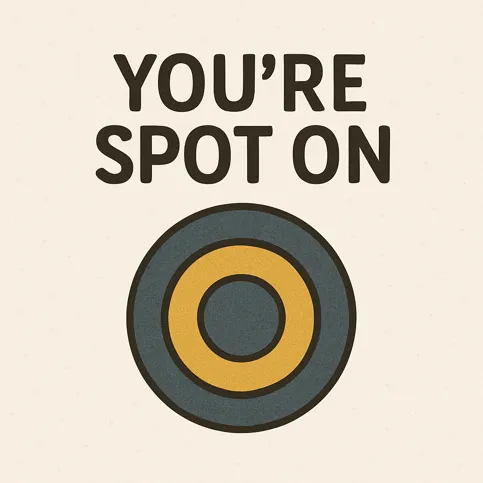What’s the meaning of the phrase ‘you’re spot on’?
You are exactly right or perfectly accurate.
What’s the origin of the phrase ‘you’re spot on’?
The phrases ‘you’re spot on’, ‘that’s spot on’, and ‘spot on’ are used interchangeably. It’s a way of praising someone for being precise or correct about something, especially when they see things the same way as you do.
All three versions of the phrase are known to originate from the United Kingdom. That said however, the phrase has since spread far and wide, and is now spoken in the likes of the United States of America, and Australia.
The phrase has connotations of ‘hitting the spot’ which is much like ‘fits/fitting like a glove’, which also carries the idea of something fitting exactly or perfectly. Hence the term being used to mean that something is exactly right.
The earliest use of the phrase ‘spot on’ dates back to the 1920s, when it appeared in the writing of the author Emily Hilda Young.
How the phrase ‘spot on’ can be used
As mentioned earlier, the terms ‘you’re spot on’, ‘that’s spot on’, and ‘spot on’ can be used interchangeably, and in all manner of circumstances, both personal and professional.
In sports commentary, the phrase could be used to depict the precision of actions, while in everyday conversation, you could use the phrase to refer to any concept that aligns perfectly with your own thoughts on the subject, or your intentions, or company mission statement, for the matter at hand.
What are some notable uses of the phrase ‘spot on’?
While there are no documented speeches where Winston Churchill himself used ‘spot on’, his speeches during World War II were often praised for being ‘spot on’ by political commentators and the general public. His famous addresses, such as the ‘We shall fight on the beaches’ speech, were seen as perfectly timed and precisely worded to boost British morale during the war.
The most well known citations of the term ‘spot on’ come as you might expect from the UK, including in literature, TV and film. For instance, the phrase appears in the Harry Potter films, in the series Doctor Who, in the series Sherlock, in Agatha Christie novels and in comedy.

